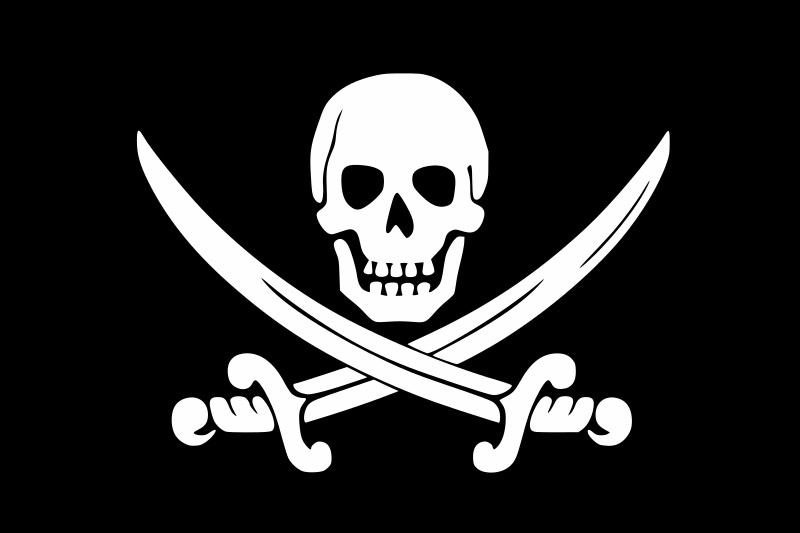We all need a Pirate’s Code

‘A Pirate’s Code. Calico Jack’ Rackham’s Jolly Roger. Public Domain Wikipedia
Who wants a Pirate’s life?
Everyone wants a life that’s full of excitement and adventure. But we also want a life that’s safe and protected, one full of guarantees, safety-nets and assurances. We dream of a life of risk without risks. The idea of risk-free risk is very appealing. And it’s not impossible to create. We just need a role that gives that to us.
During the 17th century, pirates like Edward Teach (known as ‘Blackbeard’) roamed the high seas searching for treasure. With the wind in their hair and the Jolly Roger flying above, pirate ships were places where fame and fortune could be quickly earned. If you could defend yourself in battle and your ship could outrun the Navy, you could have a rich life of high adventure.
Sadly for those pirates, the ships they attacked could fire back and the Navy had some fast ships to hunt yours down. As a result, many pirates were either hanged or shot in action. Added to the risk of death, life aboard a pirate ship wasn’t all plain sailing. It was a brutal working environment. But it was also one of mutual trust and teamwork. Pirates were often excellent workmates. That’s how they amassed so much treasure so successfully. How was that possible?
The Pirate’s Code
Every team of people operates by a set of rules. Whether those rules are written down and signed by everyone, or whether they’re merely ‘understood’ doesn’t matter. Either way, to be a team there has to be some form of governance. Even Pirates had a code.
During the 1660’s, Bartolomeu Português adapted the articles that operated on merchant ships and privateers, to create the first Pirate’s Code. This new kind of ‘joint-hands’ agreement became the basis for pirate ships everywhere. When your mission has been agreed, it’s much more likely to be successful. Do you have your people’s signatures or your people’s agreement?
Swearing the Oath and Signing the Pirate’s Code
Every crew member was required to swear an oath of allegiance to the ship’s company. And in a twist on the modern employment contract, each new crew member was asked to sign their name on the written articles. Those articles were then pinned on the outside of the Captain’s cabin door.
Some pirates cleverly avoided signing the articles, choosing to make a simple X instead. Making an indistinguishable mark was a much safer option. If your name was legible and you were caught, you were hanged. If your name couldn’t be seen, you could claim to have been an unwilling prisoner. And that might save you from the hangman’s noose at Execution Dock, on the water’s edge in Wapping, London.
In a modern organisation, you need everyone’s commitment. Not just on their employment contract, but in their hearts and heads. Anyone can given notice and leave a job. The question isn’t why would they leave? It’s why should they stay?
Equality should be treasured
Every Pirate’s Code was similar to the first, but slightly different. Each code varied by ship and by Captain. But they all had one thing in common, they were based on equality.
Bartolomeu Português’ first Pirate’s Code covered the rights and responsibilities of being a pirate. Those rights included a vote on all matters, an equal share of food and alcohol; and the right to significant compensation for injury. That created was fairness amongst the crew and a provided a financial safety-net if a pirate was unable to work due to injury in action.
There was also the right to receive a share of the plunder. Every pirate was guaranteed a share. Those with responsibility received a bit more. The Captain and Quartermaster received two shares and the other officers up to one and a half (depending on their position). The rules were clear and fair. A pirate CEO didn’t earn ten or twenty times their lowest paid staff member.
And then there was the pirate’s right of ‘parlay’ which guaranteed a pirate would be brought before a ship’s Captain to negotiate, without being attacked until the parlay was complete. How many modern companies give every member of staff a right to speak to their CEO?
All in all, being a 17th century pirate offered far more equality and income than you’d have received on a Navy or merchant vessel. With all the struggles of life in the 1600’s, no wonder people chose to become pirates.
Compliance – You know it makes sense
As well as rights, the first Pirate’s Code included a list of pirate’s responsibilities too, like keeping your weapons ‘fit for service’, not gambling for money, candles out at 8pm; and not smuggling women on board.
Some codes were prescriptive in their punishments, such as flogging or death for serious breaches. Other versions gave the whole crew a vote each time. In Bartolomeu Português’ first code, anyone caught defrauding the ship’s company was to be marooned. The threat of disciplinary action was all too real and all too frightening.
Compliance with the codes was generally high, as punishments were often severe. But occasionally things did get out of hand between crewmates. The code covered that eventuality. There was to be “No striking one another on board, but every man’s quarrels to be ended on shore, at sword and pistol.” The code made it clear that the aggrieved parties had to go onshore, stand back-to-back, march several paces away from each other, turn and fire their pistols. The articles went on to say what happened if pistol shots didn’t resolve the dispute. “If both miss, they come to their cutlasses, and then he is declared the victor who draws the first blood.”
Little of this is appropriate in today’s modern workplace, but there underlying strength of the code came from clarity, equality and fairness. With a written code, every pirate new the rules; and every pirate new the consequences. Compliance made for a happy ship. Compliance made for a wealthy ship. Compliance made sense.
Flexibility has its place
A Pirate’s Code allowed for some flexibility. In ‘Pirates of the Caribbean: The Curse of the Black Pearl’ Captain Barbosa explained that “The Code is more what you’d call guidelines than actual rules”.
But a Captain was accountable, not to some remote ship owners but to the rest of the crew. As a result, the mood of the crew was key factor in a Captain’s decision-making. So, every Captain had to be firm but fair. If a matter was contentious then every crew member got a vote. If a Captain made decisions that were unpopular, the crew could vote in a new Captain. Democracy reigned in a most unlikely place.
Teamwork and Trust
Despite their illegal activities, pirates weren’t all selfish, barbaric individuals. They understood the benefits of working together, they appreciated the skills their fellow pirates brought, they valued the camaraderie; and they trusted each other enough to rely on each other. In only four years, Bartolomeu Português’ crew reportedly captured over 470 ships. That must have taken great mutual trust and teamwork.
Although most pirates were men at this point, the biggest pirate empire of all time was run by Ching Shih. She had over 80,000 pirates at her disposal, during the Qing Dynasty. To run that size of organisation, there had to be a very clear code of conduct and the consistent enforcement of it.
Despite assumptions to the contrary, pirates could behave with honour amongst themselves. The more they supported each other, the more money they made.
Modern Codes
In the modern World, organisations use employment lawyers and human resources experts to apply the law and create organisational policies and procedures. These modern rules serve a useful compliance purpose. But they can be exhaustive and exhausting, spreading those rules across dozens of different documents, so that no one fully knows or understands them. Too many rules can create confusion and uncertainty. A code can stand above all the detail and say how things really are.
Despite having more rules and policies than ever, some modern organisations still lack the teamwork to have sustained success. Many modern teams operate as groups of separate individuals, more so than pirate ships ever did. Without mutual trust, there’s no real sense of team. Written rules matter, but personal trust matters far more.
Everyone needs to know where they stand and what the consequences of their actions are. That’s how bonds are made, not broken. I am not advocating a ‘swords and pistols’ clause in employment contracts, just the need for greater clarity around what’s in it for everyone. What’s the shared purpose? What are the shared values?
Sell the big adventure AND the protection from harm
Why should anyone work for your organisation? Don’t assume there’s enthusiasm’s a given. You need to motivate people to join and persuade them to stay. As I mentioned earlier, people want a life of risk-free risk, an adventure with no down-side. You need to offer them an adventure to go on first. Then you back it up with the guarantees, safety-nets and assurances that they’re hoping for. What adventures will you take them on? What protections, insurances and rewards will you guarantee?
Make the trade clear
Which responsibilities are they committing to in return? Make the trade crystal clear. Money is only part of that trade. That’s rarely enough to capture anyone’s imagination. What about opportunities for glory and adventure? Sell those too.
What does loyalty and commitment get you? Surely there should be something on offer for good service, for long-service? For example, would you commit to always recruiting internally if you have an eligible candidate, before going out and hiring externally? That would require an ongoing training process that gets everyone ready to step up. That rewards loyalty and increases skills. So, it encourages both. Where’s the downside?
Do you have a Pirate’s Code?
This kind of clarity could come from a code that sits on top of every other rule and policy. It could be a short-form set of principles that matter the most. In addition, there could be an agreed set of winning and losing behaviours that honour the code and support the organisation’s mission. Every rule, policy and procedure must support the code and simultaneously help to deliver the mission. Do your organisation’s rules do that? Do they make you want to part of things? Or are they bland, disconnected and demotivating?
These days, you’re unlikely to get paid in silver pieces or have a bottle of rum named after you like Captain Morgan, but other rewards will follow when there’s trust and teamwork. Is it a pirate’s life for your people, or a life of risk without any adventure to go with it?
